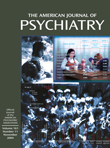To the Editor: As pointed out by Katherine A. Halmi, M.D., and Gladys Frankel, Ph.D.,
(1), the process of differential diagnosis between anorexia nervosa and anorexia due to gastrointestinal stromal tumors is sometimes problematic. The authors emphasized the importance of making a diagnosis based on positive criteria.
Nevertheless, even if the diagnosis of anorexia nervosa is evident in the case reported in their article, because the development of progressive malnutrition or cachexia is frequent in patients with gastrointestinal cancer, it still raises certain questions.
Cachexia syndrome is characterized by an involuntary weight loss of more than 5% of premorbid weight occurring within 6 months and often associated with anorexia and fatigue. Moreover, anorexia has been reported in patients with gastrointestinal stromal tumors, but unlike anorexia nervosa, it was not associated with voluntary weight loss and bingeing/purging behavior but was frequently associated with the presence of fever.
In this case, the negative criteria should also be considered, notably the absence of fever, fatigue, cachexia syndrome, and nausea and abdominal pain, which may have induced intentional anorectic behavior in the early onset of the disease.
Anorexia nervosa and cachexia are two distinct syndromes that may have synergistic effects in patients. Moreover, the occurrence of metastasis in the case report might have increased weight loss or, as pointed out by the authors, it might have been preceded by weight loss, which may lead to a perpetual cycle of maintaining weight loss and malnutrition. As the authors stated, when the tumor became a large mass, it could have created an early experience of satiety, and a highly restrictive diet might have been reinforced by undetected gastrointestinal stromal tumors.
Hence, this case report is an interesting and exceptional case of anorexia due to comorbid diagnoses. From a psychoneuroendocrinoimmunological point of view, this case deserves further attention.
Several studies in anorectic patients have found increased levels of pro-inflammatory cytokines, such as interleukin (IL) IL-1, IL-6, and tumor necrosis factor alpha (known for their anorexigenic effects), indicating autoimmune activation
(2). Pathophysiological parallels have been drawn between the role of cytokines in cancerous cachexia and their putative involvement in the undernourished states observed in anorexia nervosa
(3,
4). Tumor necrosis factor alpha, IL-1, IL-6, and interferon γ have been proposed as mediators of the cachectic process. It has been shown that the levels of these cytokines correlate with the progression of the tumors
(5).
Therefore, it is not unreasonable to consider that the assay of pro-inflammatory cytokines, such as tumor necrosis factor alpha, in this case might have been a good marker of the course of the disease and might have helped to disentangle the evolution and the contribution of the two disorders to weight loss when we considered serum levels of this cytokine.

